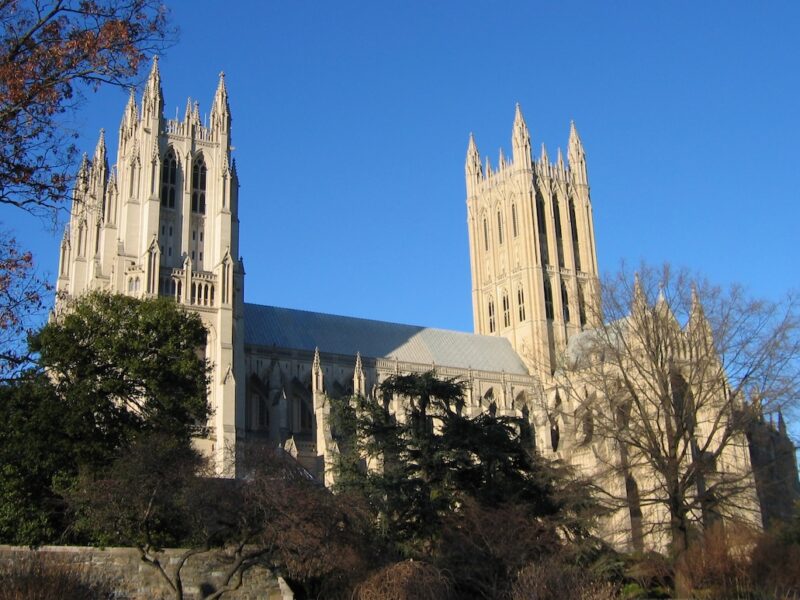I love a good theological conference, and my favorite among those that I have attended through the years has been Mere Anglicanism, an annual (most years) gathering held in Charleston, South Carolina, each January. Mere Anglicanism was previously known as SEAD, which stood for either Scholarly Engagement With Anglican Doctrine or Society for Ecumenical Anglican Doctrine (I heard both used and the acronym was used far more than anything else). I attended as a young(er) postulant in 2001, and while I was not able to attend the next year, I have attended each year that it was held since then and participated liturgically on a couple of occasions when I served as Priest Associate at the Cathedral Church of St. Luke and St. Paul, a venue for some conferences.
My schedule only allowed me to be present for the Friday session of the most recent conference, so I got to hear the Rev’d Calvin Robinson’s address on “Critical Theory: Antithetical to the Gospel?” I was aware that there would be controversy – there were points where I differed with him myself, partially because of misunderstanding (we talked afterward) and partially because of differences in theology – but I was not ready for what happened the next day when Calvin’s disinvitation from the end of conference discussion panel caused a flurry of responses that has not ceased as of the writing of this essay.
I will not address what Calvin said in his address here as it has been discussed extensively elsewhere. I do not think he should have been canceled and believe his version of events (he has been able to produce evidence corroborating his story). Barring a change in management or an at this point unforeseen change of heart I will not be attending any more. Friendships have been strained because of this and while I hope that they can be repaired I’m not sure that they will be.
I mention all of that because earlier today I was contacted with the suggestion that traditionalists should have our own conference. Well, we do have our own conferences. The Anglican Way Institute, held each year at the Church of the Holy Communion Cathedral in Dallas, and the (unrelated but similarly named) Anglican Way Conference sponsored by the Prayer Book Society and held at St. John’s Church, Savannah are two examples, and for our Canadian friends the Atlantic Theological Conference in Halifax, Nova Scotia, is well worth consideration.
Mere Anglicanism, however, was unique both in the scale of the conference and the quality of worship. An event like that takes substantial labor, both paid and volunteer, and considerable funding to pull off. In the 1983 film The Right Stuff a NASA official at one point pithily observes how crucial funding is to experimental flight by noting, “No bucks, no Buck Rogers”; the same may be said of theological conferences, and while I wouldn’t discourage the establishment of any new conferences, I would counsel those considering doing so to count the cost.
However, I think that there is another course of action worthy of consideration. Ronald Reagan observed that “All real change begins at the dinner table,” and that is a possibility worth exploring. When I was a Presbyterian seminarian (I came to Anglicanism toward the end of my studies) I was greatly blessed by a periodic gathering that would take place at First Presbyterian Church (ARP) in Columbia, South Carolina, known as the Reformed Fellowship of the Southeastern United States that brought together male ministers, elders, and seminary students from various denominations. There would be a chapel service with a sermon, lunch, and the presentation of a lecture or paper. It was good continuing education for those in ministry and a good supplement to our studies for those of us preparing for ministry.
Imagine, if you will, groups of like-minded clergy of various jurisdictions in the same geographic area gathering on a monthly (or so) basis to read Morning Prayer, have lunch, and then have a speaker or the presentation of a paper by one of the members with an ensuing discussion. I believe that such gatherings would go a long way towards building relationships, developing leaders, and strengthening those in ministry.
It would be decidedly low overhead – First, Columbia, was and is a large church with their own professional kitchen staff, but most parishes do not have those resources. They could, however, adjourn to a nearby restaurant for a Dutch-treat meal and the meetings could be rotated among the parishes in a given area. Unlike single-jurisdiction deanery meetings these gatherings would be affinity-based and would cross diocesan lines.
It’s an option worth exploring and I intend to do so in my own area. I’d encourage others to consider doing the same. By God’s grace the long-term impact may be greater than starting a new conference (I hope that readers will support existing events as they are able).





'Mere Localism' have 2 comments
January 29, 2024 @ 2:00 pm Sudduth Rea Cummings
Thank you, Chuck, for your wisdom clarity of expression. When I was younger, (aka, known as pre-retirement) I did attend all those conferences, except for the one in Halifax, and found them interesting and helpful. Has there been a major change in leadership in more recent years?
January 29, 2024 @ 2:01 pm Sudduth Rea Cummings
Thank you, Chuck, for your wisdom and clarity of expression. When I was younger, (aka, pre-retirement) I did attend all those conferences, except for the one in Halifax, and found them interesting and helpful. Has there been a major change in leadership in more recent years?